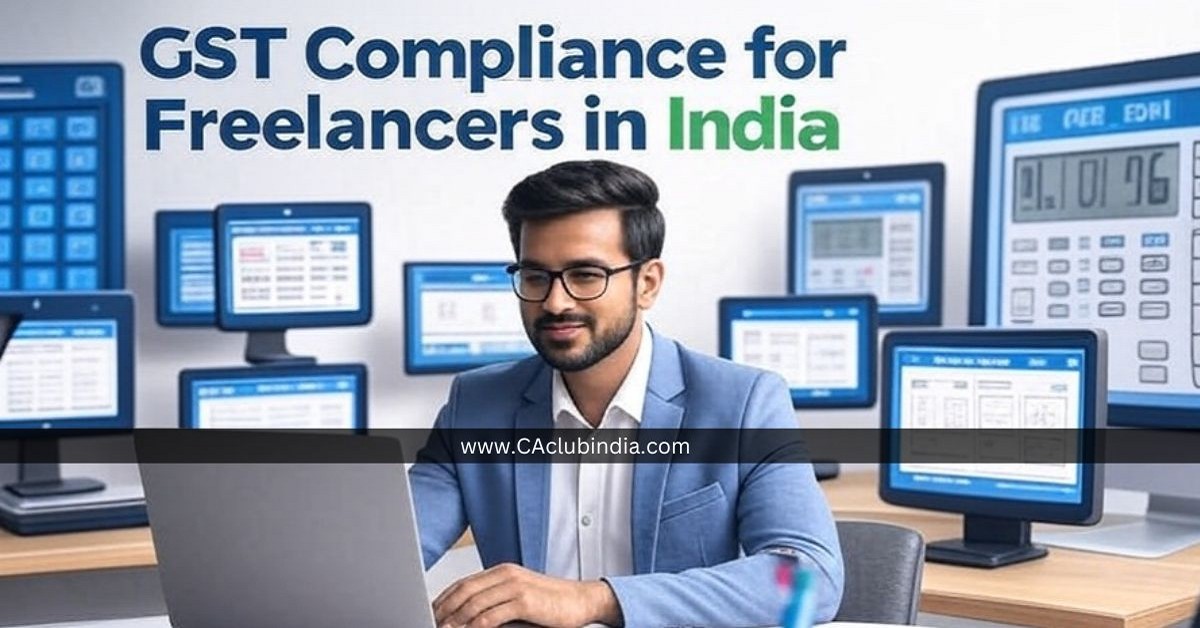Introduction
In the era of the digital economy, a large segment of India's workforce has transitioned into freelancing across domains such as IT services, content creation, consultancy, digital marketing, and online tutoring. However, many freelancers are unaware of their statutory responsibilities under Indian tax laws, particularly the Goods and Services Tax (GST) regime.
This article highlights the most common compliance mistakes made by Indian freelancers under the GST law and provides clear guidance on how to ensure lawful compliance.

I. GST Registration: Common Misconceptions
1. Misunderstanding the Turnover Threshold
One of the most widespread errors is the assumption that GST registration is not required if the freelancer's turnover is below Rs 20 lakh (Rs 10 lakh for special category states). However, this exemption does not apply in several critical cases discussed below.
2. Misconstruing Export of Services as Exempt
Freelancers offering services to foreign clients often believe that since exports are zero-rated under GST, they are automatically exempt from registration. This is a misconception.
- Under Section 16 of the IGST Act, 2017, export of services is treated as zero-rated supply, not an exempt supply.
- As per Section 24(i) of the CGST Act, 2017, any person making zero-rated supplies is mandatorily required to obtain GST registration, irrespective of turnover.
3. Inter-State Supplies Below Threshold
Freelancers providing services across state borders (e.g., from Delhi to Mumbai) often assume they can avoid registration if their turnover is below the threshold. However, this too is incorrect.
- As per Section 7 of the IGST Act, such supplies are considered inter-state supplies.
- Under Section 24(i) of the CGST Act, GST registration is mandatory for inter-state taxable supplies, even if the aggregate turnover is just Rs 100.
Practical Example:
A freelance graphic designer based in Delhi providing services to a client in Mumbai is making an inter-state supply. Even with a turnover of only Rs 1,000, the freelancer is legally required to obtain GST registration.
II. OIDAR Services and GST Registration
Freelancers offering services like digital marketing, online training, software development, SEO, and content writing-especially through online platforms without any physical interaction-may fall within the category of Online Information and Database Access or Retrieval (OIDAR) services.
Defined under Section 2(17) of the IGST Act, 2017, OIDAR services are liable for compulsory registration under Section 24(i) of the CGST Act, regardless of the recipient's location or freelancer's turnover.
III. Categories Where GST Registration is Mandatory
Based on the above, the following categories of freelancers must register under GST:
|
Category |
Legal Reference |
Registration Requirement |
|
Export of goods/services |
Section 16, IGST Act + Section 24(i), CGST Act |
Mandatory, regardless of turnover |
|
Inter-state supply of services |
Section 7, IGST Act + Section 24(i), CGST Act |
Mandatory, even for Rs 1 transaction |
|
OIDAR services |
Section 2(17), IGST Act + Section 24(i), CGST Act |
Mandatory |
IV. Post-Registration GST Compliance Requirements
Once registered, a freelancer must fulfill the following return filing and tax payment obligations:
1. Monthly/Quarterly Returns
- GSTR-1: A monthly (or quarterly under QRMP) statement of outward supplies including invoices, exports, and credit/debit notes.Due Date: 11th of the following month (or 13th of the quarter for QRMP scheme).
- GSTR-3B: A monthly summary return containing tax liability, input tax credit, and tax payment details.Due Date: Generally 20th of the following month (may vary).
2. Annual Returns
|
Return Type |
Applicability |
Notes |
|
GSTR-9 |
Mandatory if turnover exceeds Rs 2 crore |
Consolidates all GSTR-1 and GSTR-3B filings |
|
GSTR-9C |
Required if turnover exceeds Rs 5 crore |
Reconciliation statement (self-certified from FY 2020-21 onwards) |
V. Export of Services: Not Automatically Exempt
Although exports are zero-rated, this benefit is not automatic and is subject to prescribed conditions under the GST Rules.
Conditions to Claim Exemption on Export
A freelancer must either:
- File a Letter of Undertaking (LUT) in Form GST RFD-11 (under Rule 96A of the CGST Rules), or
- Pay IGST at the time of export and subsequently claim a refund under Rule 96.
Failure to comply with these procedural steps will result in the export being treated as a taxable supply, and the department may levy tax, interest, and penalties under Sections 73 or 74 of the CGST Act, 2017.
Summary of Penalties for Non-Compliance
|
Type of Default |
Relevant Section |
Penalty/Consequences |
|
Non-registration |
Section 122 |
Rs 10,000 or amount of tax evaded, whichever is higher |
|
Non-filing of returns |
Section 47 |
Rs 50/day (Rs 25 CGST + Rs 25 SGST) per return |
|
Interest on late payment |
Section 50 |
18% per annum |
Further Reading: For detailed guidance on claiming zero-rated benefits, refer to our companion article: Click Here
To summarize:
- GST registration is compulsory for freelancers engaged in exports, inter-state supplies, or OIDAR services, regardless of turnover.
- Post-registration, timely filing of GSTR-1, GSTR-3B, and (where applicable) GSTR-9 and GSTR-9C is essential.
- Exports are zero-rated, not exempt, and must comply with procedural conditions like LUT filing or IGST refund.
- Non-compliance invites interest, penalty, and even prosecution in some cases.
If you still have any queries or require professional assistance in relation to LUT filing, GST compliance for export of services, or any zero-rated supply matters, feel free to contact us at:
The author can also be reached at arunmukeshgupta96@gmail.com
We would be glad to help you ensure full compliance under the GST regime.









 CAclubindia
CAclubindia
